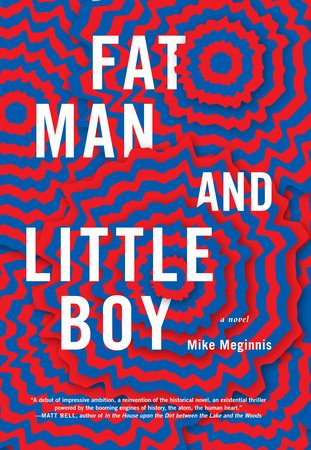
Fat Man and Little Boy
Mike Meginnis
On Sale: 10/14/2014 | $16
9781936787203 | Paperback 5-1/2 x 8-1/4 | 176 pages Buy it Now
Book Description
Two bombs over Japan. Two shells. One called Little Boy, one called Fat Man. Three days apart. The one implicit in the other. Brothers.
Named one of Flavorwire‘s best independent books of 2014, and winner of the 2013 Horatio Nelson Fiction Prize.
In this striking debut novel, the atomic bombs dropped on Japan are personified as Fat Man and Little Boy. This small measure of humanity is a cruelty the bombs must suffer. Given life from death, the brothers’ journey is one of surreal and unsettling discovery, transforming these symbols of mass destruction into beacons of longing and hope.
“Impressive. . . The novel straddles a hybrid genre of historical magical realism.” —The Japan Times
“Meginnis’s talent is his ability to make the reader feel empathy for souls who killed so many. . . Many pages in this novel feel like engravings . . . Meginnis has written one of the best, most natural novels about the atomic bombs.” —Nick Ripatrazone, The Millions
“[An] imaginative debut. . . Meginnis’ story is both surprising and incisive.” —Publishers Weekly
Praise For This Book
"Impressive. . . The novel straddles a hybrid genre of historical magical realism." —The Japan Times"Meginnis's talent is his ability to make the reader feel empathy for souls who killed so many. . . Many pages in this novel feel like engravings . . . Meginnis has written one of the best, most natural novels about the atomic bombs." —Nick Ripatrazone, The Millions
"[An] imaginative debut. . . Meginnis' story is both surprising and incisive." —Publishers Weekly
Named one of "the year's most impressive debut novelists" by the 2014 Brooklyn Book Festival
"An imaginative and surprisingly intimate look at the consequences of our actions and the costs of war." —Library Journal
"In his inventive and fabulist debut novel Fat Man and Little Boy Mike Meginnis lends a surprisingly human dimension to the atomic bombs dropped on Japan during World War II." —Largehearted Boy
"Throughout Fat Man and Little Boy, Meginnis's language is luminous and disarmingly spare, whether he is invoking a naturalist moment or a fantastical metamorphosis." —Necessary Fiction
"Beguiling, strange, and strangely lovely, Fat Man and Little Boy is a deeply sorrowful yet mysteriously empowering debut."—Patrick deWitt, author of The Sisters Brothers
"Only someone with the deftness of heart of a writer like Mike Meginnis could redefine the war novel into something like Fat Man and Little Boy, a book which translates our basic world of never–ending terror into a highly nuanced and inventive diorama available absolutely nowhere else."—Blake Butler, author of Scorch Atlas and There is No Year
"Mike Meginnis is my favorite kind of writer—extraordinarily inventive, formally curious, profoundly moving—and his Fat Man and Little Boy is a debut of impressive ambition, a reinvention of the historical novel, an existential thriller powered by the booming engines of history, the atom, the human heart." —Matt Bell, author of In the House upon the Dirt between the Lake and the Woods
"In Fat Man and Little Boy, Mike Meginnis takes the mother of all atrocities and makes it strange, sizable, turns it so sideways that we're forced to notice, to take heed. This alone is an achievement, but it's the way he does it that dazzles—with gorgeous, careful prose that gives us human failings and a desperate longing for connection so vividly rendered that we have no choice but drink it in, to reckon once again with this disaster in our own time and way."—Amber Sparks, author of The Desert Places and May We Shed These Human Bodies







